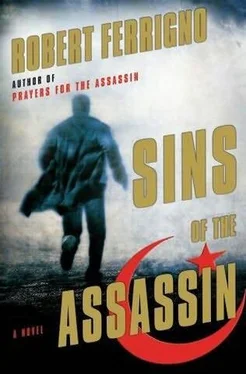“Peekaboo!” Baby peered through the tent flap.
Rakkim yawned. He hadn’t picked up on Baby-her light footsteps overshadowed by the Colonel and Gravenholtz. He sat up in bed. “Morning.”
The Colonel stepped into the tent, bending his head to clear the canvas. “Hope you don’t mind the interruption,” he said, pleased with himself. “Turnabout’s fair play.”
“You’re a hard man to find,” said Baby. “The Colonel’s been looking high and low.”
A bowie knife slashed open the back of the tent, the blade just inches from Rakkim on the downstroke. Gravenholtz muscled his way in.
Rakkim swung his legs out of bed, fully dressed. “Thanks, Red, it was getting kind of stuffy in here.”
“Lester, that wasn’t necessary,” chided the Colonel. “This is Lester Gravenholtz, my second in command.”
Rakkim saw the challenge in Gravenholtz’s eyes as he sheathed the bowie knife in his boot. Double-barreled machine pistol. Blousy cammie trousers and a big-weave thermal T-shirt that showed his taut musculature. Dressed for intimidation. Rakkim had to admit, close up the Jap job was impressive. Gravenholtz moved naturally without any hint of the eighth-inch polycarbon-fiber sheathing under his skin. The redhead balled his fists. The knuckles would be reinforced, strike plates inserted along the sides of his hands. In spite of the advanced technology, Rakkim found the idea repugnant. Fedayeen genetic boosters dramatically improved one’s natural gifts, but without discipline and training the boosters were pointless. A Jap job led to arrogance and dependency.
“What are you looking at, cocksucker?” said Gravenholtz.
“Grandma, what big teeth you have.”
Baby laughed.
“Peace in the valley, you two,” ordered the Colonel. “This isn’t really a social call, Rikki. I had you checked out…there’s two hundred million dollars in the overseas account, just as you said. The money transfer bounced around the world before landing in the Bank of Liechtenstein, but my contact traced the point of origin to a bank in Moscow. It seems your story is accurate. That part of it anyway.”
“I wish you’d hurry up and decide who we’re in bed with, Zachary,” said Baby. “That Chinaman you told me about sounded like a real stick-butt, wrinkling his nose at our food and asking if the water was safe to drink. Besides, how can we trust an atheist to keep their end of the bargain?” She eyed Rakkim. “I vote for this one.”
The Colonel kissed her gently on the cheek. “You don’t have a vote, darling.”
“Have you found the weapon yet?” Rakkim said to the Colonel. “The Russians are eager for their technical expert to get started.”
“I’ll let you know when the time comes,” said the Colonel. “Don’t want to get ahead of yourself. In the meantime, I’m interested to know how you penetrated our security cordon. The sentries guarding my home have already been debriefed. Clever, bringing them coffee.”
“I still say we should have shot the sons a bitches,” said Gravenholtz.
“I don’t waste men, Lester.” The Colonel pulled down the jacket of his uniform, maintained his perfect appearance. “Reassignment and loss of a month’s pay is sufficient to spread the message that we have to remain vigilant.” He held open the tent flap and they all filed out into the morning. “I’ll give you a tour of the camp, Rikki, although I doubt you really need it.”
“You boys have fun,” called Baby. “I’m going horseback riding.”
“Take a couple men with you,” said the Colonel.
Baby waved and kept walking.
“She’s not going to listen.” The Colonel watched the tight seat of her jeans as she strode down the line of tents, her blond ponytail swinging with every step. “She’ll do exactly what she wants.” He kept watching her. “Are you married, Rikki? No, that’s right…you already told me you’re a bachelor. My first wife was killed during the war. Wife and all three children. An accident, not your people. I never thought I’d remarry. Wasn’t like I didn’t have enough to occupy me…and there’s a certain freedom to a life without emotional entanglements, as I’m sure you know. Then I met Baby a few years ago…and everything changed.” He sighed as she disappeared behind a cluster of machinery, absently touched his dyed black hair. “I know she’s too young for me…but I couldn’t imagine life without her.”
“You’re a lucky man,” said Rakkim.
“Yes, I am,” said the Colonel.
The three of them walked past a line of seven-ton trucks being worked on. Men bent over the open hoods with wrenches and socket sets; others had removed the tires and were checking and replacing brakes. Too busy and too greasy to salute, the men acknowledged the Colonel with polite greetings and nods of their heads. He returned their greetings, acknowledging them by name.
“Maintenance and resupply are the backbone of any military,” said the Colonel. “It’s not glamorous, they’ll get no parades, but if a truck full of munitions or gasoline breaks down, a battle can easily swing in the wrong direction. Keep your mechanics and drivers happy, that’s one of the key-stones of victory.”
“My experience is mostly with very small units.” Rakkim noticed a couple of the Colonel’s personal guards had fallen in behind them, keeping their distance, but ready to defend him if need be. “We kept a low profile and lived off the land.”
“Guerrilla operations do require different tactics,” agreed the Colonel. The sun came out; every button on his uniform gleamed. “Now, how did you get into camp? We had motion sensors along the perimeter, all of them in good working condition.”
Rakkim smiled. The Colonel had lulled him into talking about himself. “It was a dog, Colonel. A large brown mutt.”
The Colonel turned, raised an eyebrow. “A dog, Rikki?”
“I figured you’d have a perimeter established so I picked up a stray in the nearest town,” said Rakkim. “Picked up a bag of hamburgers too. Cute pooch, but underfed. That night I started up the south slope. Every twenty or thirty yards, I’d toss a bit of hamburger up ahead, let the dog go bounding through the brush after it. Eventually he tripped the sensors and set off the alarm. Lights came on, sentry came out. He saw the dog, patted him on the head. Lights went out. I shadowed the sentry past the sensors and kept going.” Rakkim shrugged. “Wasn’t that hard, really.”
The Colonel laughed. “No wonder the Russians hired you.”
“That Fedayeen razzle-dazzle is overrated,” said Gravenholtz.
“Lester has a point,” said the Colonel. “We’ve intercepted several of your former compatriots. Of course, that makes Rikki’s success even more laudatory.”
“More like lucky,” said Gravenholtz.
“Don’t take it personally, Rikki, Lester doesn’t like anyone.”
“Let him take it personally,” said Gravenholtz. “Fine by me.”
They kept climbing. Had to give the Colonel credit, he maintained a fast pace while giving a running commentary about troop rotations and local politics, the unique hazards of a mountain bivouac, and the necessity of his periodic trips to put down bandits and keep the peace.
“What do the men think you’re looking for in the mountain?” said Rakkim.
“The lost gold of Fort Knox,” said the Colonel. “Barrels of diamonds. A vein of platinum that goes clear to the center of the earth. I’ve heard it all bandied about. Besides you, Rikki, the only ones who know the truth are myself, Baby, and a very special fellow from New Orleans, a finder named Moseby.”
“I’d like to meet this Moseby,” said Rakkim.
“Soon.” The Colonel pointed out the Monsoon 4 under a camouflage tarp. “I imagine that’s how the Russians realized something important was happening here.”
Читать дальше












